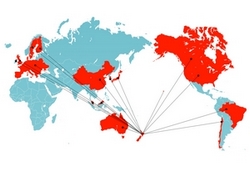Scientists help to pave global pathways

International discussions on trade and policy used to be the domain of politicians and business people. As global issues become increasingly complex and interconnected, scientists have become important members of negotiating teams. Senior scientists and executive managers from Scion are regular participants in a growing number of international delegations aimed at building strategic relationships overseas.
Scion’s General Manager for Bioproduct Development, Dr Elspeth MacRae, has been part of several missions to Europe, Scandinavia, Canada and Brazil led by New Zealand government departments. The purpose of these trips was to explore opportunities associated with sustainable forestry, climate change and bioproducts, targeting countries with aligned interests.
“Scion gets involved in areas where we have the capability and the research to help facilitate useful connections and support the needs of policymakers,” she explains. “Scientists are part of the discussions because many of the issues, needs and solutions being negotiated at governmental level are science-based.”
Government missions are frequently associated with free trade agreements, environmental collaboration agreements or the harmonisation of standards. Science-based information is often key to avoiding non-tariff trade barriers. Scion has contributed heavily to negotiations ranging from timber building standards in Japan, to quarantine standards for forest products to India. Other missions aim to position New Zealand as a valued partner in science and business collaborations.
As a result of global networking, Scion is now working with VTT, a major science organisation in Finland. This research relates to lignin, an important by-product of bioenergy technologies and bioproduct development. This is one example of a growing number of collaborations between Scion and other international research organisations that help New Zealand to build science capability and leverage overseas research investment.
As innovation becomes an important driver of economic growth, scientists are increasingly called on to attend diplomatic missions of all kinds. Dr Trevor Stuthridge, the General Manager for Sustainable Design, sees this activity as part of Scion’s role in helping the New Zealand forest industry to create new opportunities.
He recently joined industry representatives on a trip to Canada arranged by New Zealand Trade and Enterprise. The purpose of the mission was to learn about scale-up technologies for converting woody biomass into bioenergy. Similar missions sponsored by government departments have also been held with China, Chile, Korea and the USA.
“By participating in international missions we can provide technical context when needed to help people understand the potential of emerging technologies,” Trevor says. “It also enables us to gain market intelligence that we can feed back to the industry.”
“Many of the issues faced by the New Zealand forest industry are shared by other countries. While it is obviously important to protect our commercial interests, there is also benefit to be gained from building networks, sharing ideas and adopting technologies to suit.”
